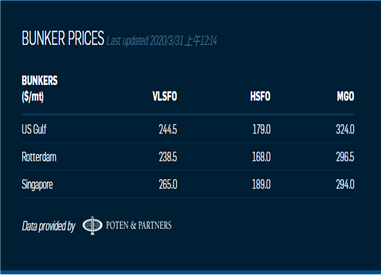 Dry bulk faces 'inevitable disruptions'
Dry bulk faces 'inevitable disruptions'
The dry bulk market is facing inevitable disruptions caused by the widespread coronavirus, which has been forcing lockdowns and mining operations to halt. However, there is some optimism among owners about the market's ability to recover
THE dry bulk market is facing “inevitable disruptions” caused by the unexpected coronavirus outbreak, owners have said.
Speaking on an online version of Capital Link’s International Shipping Forum, leading dry bulk owners said there was no period market at the moment, with trades taking place in the spot market due to the uncertainty about the longevity of the virus.
Should the virus linger for an extended period of time, this would be “very serious,” Grindrod Shipping’s chief executive Martyn Wade warned.
He added that should dry bulk terminals close for a couple of months in countries such as Argentina and Brazil, which rely on commodity exports for revenue, the impact on their economies would be unimaginable.
With China largely controlling the infection, the nation is in a recovery mode right now, according to Safe Bulkers’ president Dr Loukas Barmparis, a view echoed by the other owners as a source of optimism.
Seanergy Maritime’s chief executive Stamatis Tsantanis noted that iron ore prices were rising to $85 to $90 per tonne, an indication of China’s comeback. That means the market might expect a rapid recovery in rates as was seen in the latter half of last year.
The group expected average capesize spot rates ranging from $12,000 to $20,000 per day for the rest of the year, with panamaxes likely to see $11,000 to $12,000 per day.
However, while China was returning to normal operations — with most of its labour force back at work — other importing nations in lockdown such as India will have to find a solution to keep trade flowing. The disruption caused by the restrictions could last for weeks or months.
“We have faced these crises before and we all have to find a way to get through this,” Scorpio Bulkers’ president Robert Bugbee said, adding that “central governments will be hell-bent on keeping employment and feeding people.”
According to Star Bulk’s president Hamish Norton, credit in the dry bulk market is deteriorating. He urged caution when dealing with counterparties other than the large miners or utilities.
Mr Bugbee noted that there were traditional cash buyers in the market looking for discounted tonnage. He added that with delays to scrubber retrofits, there was no urgency to get the work done, given the very narrow price spread between low and high sulphur fuel oils.
Even though yards were getting back to normal operations, there was a need to preserve cash, he said.
Asked about consolidation during times of stress and weak markets, Mr Wade from Grindrod said it was “premature” for the industry to consider this, although there may be opportunities in a few months’ time.
Today's Bunker Prices:



